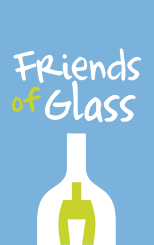Brussels, 22 November 2022 – Glass is never waste. And as Europe marks European Week of Waste Reduction, new findings reveal that nearly 8 in 10 consumers view glass as a packaging material fit for the future – one that can help them to live healthier lives, on a healthier planet.
An independent research survey carried out among more than 4,000 consumers across 13 European countries, commissioned by the European Container Glass Federation (FEVE) for the Friends of Glass consumer platform shows the majority of consumers view glass as a packaging material that is future proof, recognising its credentials on bringing both recyclability and health benefits to the table.
Shoppers look for packaging options that are healthy as well as recycled
Against a backdrop of consumers trying to cut back on packaging, glass is the only packaging material that consumers say they use more of in the last three years – by 8% – while bag-in-box, metal, and plastic have all seen drops of between 24%-41%.
Glass is considered an integral part of a healthy living lifestyle, because it’s inherently reusable and recyclable, and recycled effectively across Europe after use and always safe even when recycled. Consumers believe in and trust glass recycling, with 8 out of 10 respondents saying they ‘always’ or ‘often’ recycle their glass packaging and 82% stating they have a good understanding of how to recycle. Half of the respondents even said they buy more in glass specifically because it can be recycled more effectively than other packaging materials. These results support recent Close the Glass Loop data on recycling rates in Europe, showing an average of 79% glass collection across the bloc.
What’s more, health and product preservation remain high on the agenda for shoppers. Respondents point to an evolved understanding of sustainability that goes beyond a single environmental focus.
6 out of 10 consumers consider reducing food waste, recycling and protecting physical and mental health as the top three sustainability elements in their everyday life.
Over a third of consumers polled stated they’re choosing more glass packaging specifically because it better preserves health and keeps products safer for longer.
7 in 10 Europeans trust recycled glass to continue to protect food and drinks from any health hazards after recycling.
As such, glass is seen by consumers as the safest recycled material and to offer the best of both worlds for packaging that’s protective of people and planet. Glass’ shelf stable qualities allow people to reduce their food waste by protecting their favourite products for longer – considered a must-have as inflation continues to bite and people look to stock up on lasting pantry staples.
Companies should lead on sustainability with the help of glass
Where most consumers believe in glass as a material for the future, they look to their favourite brands to lead on offering sustainable product packaging options – led by glass, naturally.
4 in 5 of those surveyed agreed that companies have a moral obligation to use sustainable packaging, with almost as many (78%) looking to brands to clearly state their sustainability progress or credentials on their packaging. 65% even state they trust the quality of a product more when it is packaged in glass. That’s why one way forward for brands looking to stand out from the pack could be to adopt the new Glass Hallmark. Designed as a visual tool for brands and retailers to better communicate health and environmental credentials of glass to consumers, the hallmark is intended to remind consumers what they love about glass and how easy it is to recycle it.
Businesses know that the right packaging plays a vital role in product preservation, recall, brand differentiation and experience. Glass has long been a trusted partner in this. To this end, the container glass industry actively looks to reinforce its credentials on light weighting, recycling and decarbonisation to meet brands’ and consumers’ demands for more sustainable packaging options that continue to deliver on consumer experience.
Commenting on the survey results, Adeline Farrelly, Secretary General of FEVE, the European Container Glass Federation said:
“As people continue to celebrate the International Year of Glass, and policymakers set their sights on new waste reduction targets, these findings prove that consumers increasingly recognise glass as a healthy, widely recycled everyday packaging material – one that is already proven to deliver on commitments to a healthier world.
As an industry we are constantly looking for ways to innovate to ensure glass continues to be a sustainable material that we can rely on to protect our health and that of the planet. We’re happy to see consumers recognize these qualities and validate that glass is the packaging material that will see us into the future. Now it’s over to our favourite brands to pick up that challenge.”
We’re all trying to live better, from how we consume and dispose of products to how we look after our own health. Yet packaging remains crucial to preserve products through delivery and storage, and to ensure longer shelf stability of products once purchased. Glass is a natural material, produced by using raw materials (sand, soda ash, limestone) in combination with cullet (recycled glass). By offering a material that’s not just endlessly recyclable but remains food safe throughout the closed-loop recycling process, glass packaging continues to provide strong sustainable benefits for the health of both people and planet.
For more information on this European survey and to access the detailed findings, please visit www.glasshallmark.com. Results are also available at a country level.
For further information on the results, please contact:
Michael Delle Selve, Head of Marketing and Communications, FEVE – the European Container Glass Federation
m.delleselve@feve.org
+32 (0)2 536 00 82











